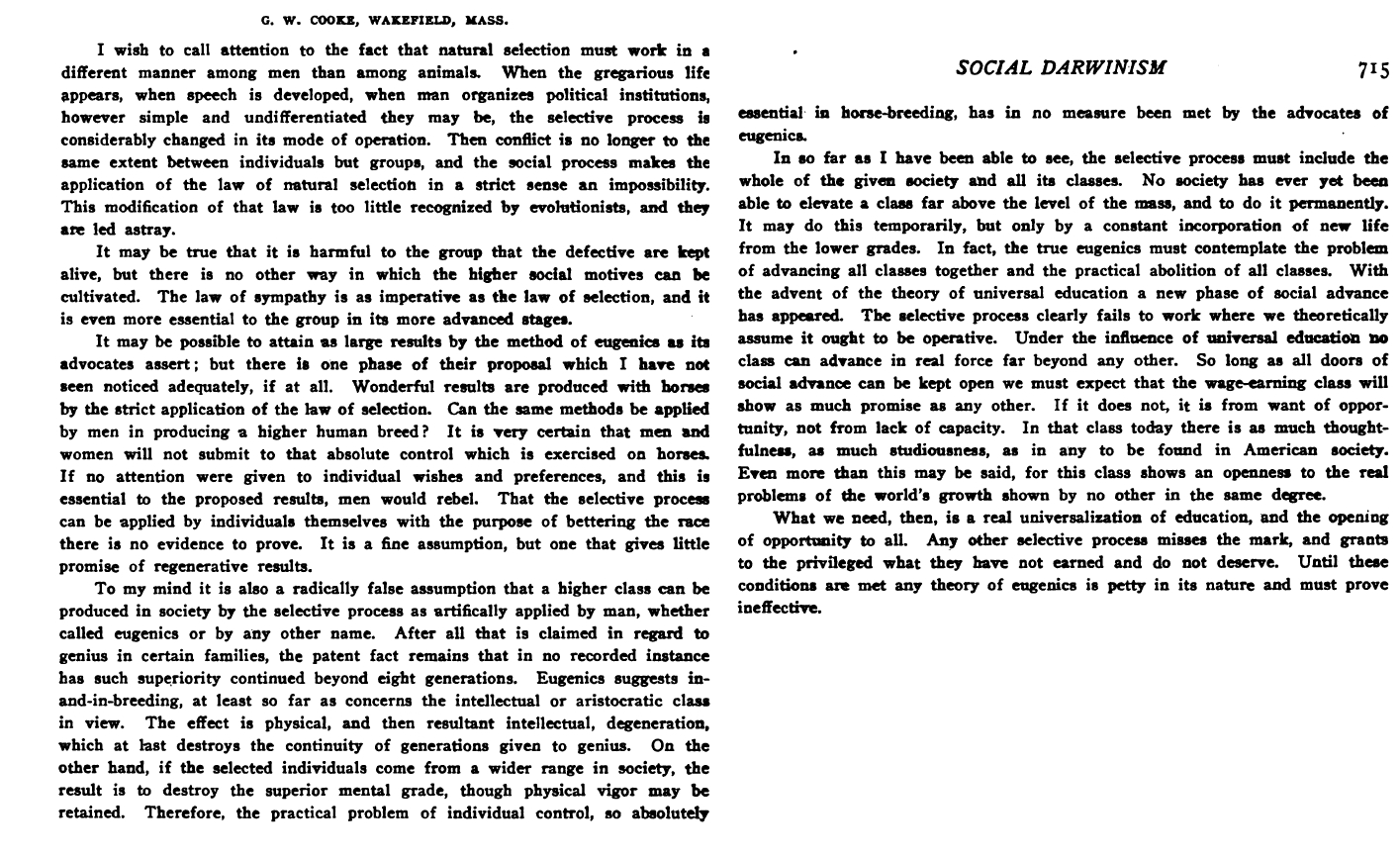Source: G.W. Cooke, discussing ‘Social Darwinism’ in American Journal of Sociology 12 (March 1907), 714-715.
Below the image is OCR scanned text. If anyone would like to send a cleaned edition, that would be greatly appreciated.
I wish to call attention to the fact that natural selection must work in a different manner among men than among animals. When the gregarious life appean, when speech is developed, when man orpnir:ee political institutions, however simple and undifferentiated they may be, the selective process ii considerably changed in its mode of operation. Then conflict is no longer to the same extent between individuals but groups, and the social process makes the application of the law of natural selection in a strict sense an impossibility. This modification of that law i• too little recognized by evolutionista, and they a~ Jed utray.
It may be true that it is harmful to the group that the defective are kept alive, but there i1 no other way in which the hlper eoclal motives can be cultivated. The law of sympathy i1 s1 imperative a, tlie law of seleetice, and it is even more essential to the group in !ta more advanced atagea.
It may be pouible to attain u large re1111lt1 by the method of eugenka u ita advocatee assert ; but there la one pbaae of their propoeal wblcb I have not seen noticed adequately, if at all. Wonderful re1111lta are produced with borae1 by the 1trlct application of the law of selection. Can the same methods be applied by men in producing 11 higher human breed ? It i1 Tery certain that men and women will not submit to that absolute control which is exercised on boraea. If no attention were given to individual wishes and preferences, and this i1 essential to the proposed resulta, men would rebel. That the ,elective proce91 can be applied by individual, themselves with the purpoee of bettering the race there i1 no evidence to prove. It i1 a fine assumption, but one that gives little promise of regenerative results.
To my mind it is also a radically false aasumption that a higher clan can be produced in society by the selective proceas a1 artifically applied by man, whether called eugenics or by a·ny other name. After all that is claimed in regard to genius in certain families, the patent fact remains that in no recorded instance bas such superiority continued beyond eipt generations. Eugenics suggests inand-in-breeding, at least so far as concerns the intellectual or aristocratic clau in view. The effect is physical, and then resultant intellectual, degeneration, which at last destroys the continuity of generations given to genius. On the other band, if the selected individuals come from a wider range in society, the result is to destroy the superior mental grade, though phyaical vigor may be retained. Therefore, the practical problem of individual control, so ablolutel7
aaential- ha bone breediag, bas in no mea111re been met by the acnocates of eugenics.
In ao far u I have been able to see, the selective proceu must include the whole of the given eociety and all ita claases. No IOciety baa ever yet beea able to elevate a clue far above the level of the mass, and to do it permanentl)’. It may do this temporarily, but only by a constant incorporation of new life from the lower grades. In fact, the true eugenics mu11t contemplate the problem of advaacing all claue1 together and the practical abolition of all classes. With the adYent of the theory of universal education a new phase of social advance bu appeared. Tbe selective proces, clearly fails to work where we theoretically usume it ouglat to be operative. Under the infl.aeace of aniversal education DO claa can advance in real force far beyond any other. So long u all doon of IOCia1 acivance can be kept open we must expect that the ,rage-aming clua will ahow as much promise u any other. If it does not, it ia from want of opportunity, not from lack of capacity. In that class today there is u much thoughtfulness, as much atudiou1nes1, u in any to be found in American aociety. Even more than thi11 may be said, for this class shows an opennea to the real problem, of the world’s growth 1hown by no other in the same degree.
What we need, then, la a real universaliutioa of education, and the opening of oppommity to all. An1 other selective proceaa misaea the mark, and grants to the pmilerecl what they bave not earned and do not deee”e. Until theae conditions an met any theory of eugenics ia petty in its nature and must prove ineffectiTe.


Recent Comments